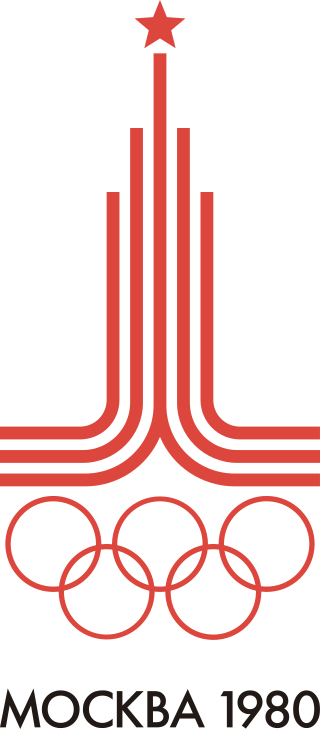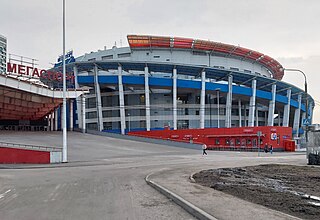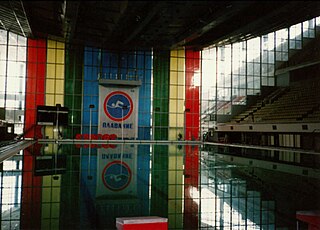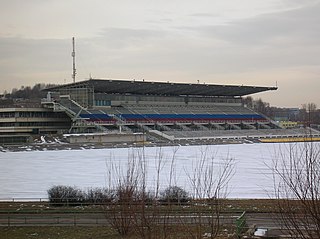
The 1980 Summer Olympics, officially known as the Games of the XXII Olympiad and officially branded as Moscow 1980, were an international multi-sport event held from 19 July to 3 August 1980 in Moscow, Soviet Union, in present-day Russia. The games were the first to be staged in an Eastern Bloc country, as well as the first Olympic Games and only Summer Olympics to be held in a Slavic language-speaking country. They were also the only Summer Olympic Games to be held in a self-proclaimed communist country until the 2008 Summer Olympics held in China. These were the final Olympic Games under the IOC Presidency of Michael Morris, 3rd Baron Killanin before he was succeeded by Juan Antonio Samaranch, a Spaniard, shortly afterward.

The Grand Sports Arena of the Luzhniki Olympic Complex, commonly known as Luzhniki Stadium, is the national stadium of Russia, located in its capital city, Moscow. Its total seating capacity of 78,011 makes it the largest football stadium in Russia and the ninth-largest stadium in Europe. The stadium is a part of the Luzhniki Olympic Complex, and is located in Khamovniki District of the Central Administrative Okrug of Moscow city. The name Luzhniki derives from the flood meadows in the bend of Moskva River where the stadium was built, translating roughly as "The Meadows". The stadium is located at Luzhniki Street, 24, Moscow.

Handball at the 1980 Summer Olympics was represented by 2 events - a men's and a women's team competitions. They were held in two venues: in the Sokolniki Sports Palace and in the Dynamo Sports Palace at Khimki-Khovrino. The schedule began on July 20 and ended on July 30. 100,493 spectators watched 51 matches of handball events at venues, mentioned above.

Vsevolod Mikhailovich Bobrov was a Soviet athlete, who excelled in football, bandy and ice hockey. He is considered one of the best Soviets ever in each of those sports.
Moscow 2012 was one of the five short-listed bids for the 2012 Summer Games, and was to be held in Moscow, Russia. The capital city's Olympic plans were to build on top of the legacy created after the 1980 Summer Olympics. Moscow's River Plan called for every single competition to be staged within city limits, which made the city's proposal one of the most compact ever. All existing venues were to have been extensively renovated and more venues were planned to be constructed in time for the Olympics. A new, modern athletes village would have been constructed on the Moscow River, which was the centerpiece and core of the city's Olympic bid. Despite the high support from the entire nation and invaluable experience, Moscow's bid suffered from a lack of accommodation and an older transport system which may not have been able to cope with the expected traffic from the Olympics.

Luzhniki Palace of Sports, formerly the Palace of Sports of the Central Lenin Stadium, was a sports arena in Moscow, Russia, a part of the Luzhniki Olympic Complex. Built in 1956, it originally had a spectator capacity of 13,700. It was rebuilt in 2002, and eventually demolished in 2023, with plans to construct a replacement arena on the site.

The 1973 Summer Universiade, also known as the VII Summer Universiade, took place in Moscow, Soviet Union.

Alexander Gomelsky Universal Sports Hall CSKA, also known as USH CSKA, and formerly known as CSKA Palace of Sports, was a multi-purpose indoor sporting arena located in Moscow, Russia.

Megasport Sport Palace, formerly Khodynka Arena or Ice Sport Palace, is a multi-purpose indoor arena that is located in Moscow, Russia. The arena is situated in the Khodynka Field and has a maximum seating capacity of 13,926 people. Opened in 2006, the arena is primarily used to host basketball and ice hockey games.
The Luzhniki disaster was a deadly crowd crush that took place at the Grand Sports Arena of the Central Lenin Stadium in Moscow during the 1982–83 UEFA Cup match between FC Spartak Moscow and HFC Haarlem on 20 October 1982. According to the official enquiry, 66 FC Spartak Moscow fans, mostly adolescents, died in the crush, which made it Russia's worst sporting disaster. The number of fatalities in this crush was not officially revealed until seven years later, in 1989. Until then, this figure varied in press reports from 3 to 340 fatalities. The circumstances of this disaster are similar to those of the second Ibrox disaster in Scotland.

The Druzhba Multipurpose Arena is an indoor arena in Moscow, Russia, part of the Luzhniki Sports Complex. It was built in 1979, and the first competition held there was the finals of the 7th USSR Summer Spartakiad. It hosted volleyball preliminaries of the 1980 Summer Olympics and was a venue of the 1986 Goodwill Games. The capacity of the arena is for 3,500 people and is the regular home venue of WVC Dynamo Moscow Volleyball team.

The Olympic Pool, formerly Swimming Pool of the Central Lenin Stadium is an aquatics center that is part of the Luzhniki Sports Complex in Moscow, Russia. It was opened in 1957 and renovated in 1980. The 10,500-seat venue hosted water polo events at the 1980 Summer Olympics. It also hosted events of the 1973 Summer Universiade, 12th World Festival of Youth and Students, 1986 Goodwill Games, Spartakiads of the Peoples of the USSR and others.
The Luzhniki Small Sports Arena is an 8,700-seat indoor arena that is part of the Luzhniki Sports Complex in Moscow, Russia. The arena was built in 1956 in the Soviet Union. It hosted volleyball competitions during the 1980 Summer Olympics.

Dynamo Palace of Sports is an indoor sporting arena located in Khovrino District, Moscow, Russia. The capacity of the arena is 5,000. It was built during the preparations for the 1980 Summer Olympics, hosted by Moscow, USSR and was used as a venue of the handball tournament there.

Sokolniki Park, named for the falcon hunt of the Grand Dukes of Muscovy formerly conducted there, is located in the eponymous Sokolniki District of Moscow. Sokolniki Park is not far from the center of the city, near Sokolnicheskaya Gate. The park gained its name from the Sokolnichya Quarter, the 17th-century home of the sovereign's falconers. It was created by Tsar Alexei Mikhailovich, a keen hunter who loved to go falconing in the area.

The Luzhniki Olympic Complex is one of the biggest multifunctional sports complexes of the world, built between 1955 and 1956, it is located in the Khamovniki district of Moscow, Russia. Formerly known as the Central Lenin Complex, it served as the Olympic Park for the 1980 Summer Olympics.

The Swimming Pool at the Olimpiysky Sports Complex was a covered swimming centre in Moscow, Russia. The venue, built for the 1980 Summer Olympics, makes up the Olimpiysky Sports Complex architectural ensemble together with the Olimpiysky Arena.

The Bittsa Equestrian Complex of the Moscow City Sports Committee, Russian: Конноспортивный комплекс "Битца" Москомспорта), former Trade Unions' Equestrian Complex, is an equestrian venue located near Bitsa Park in the South District of Moscow city, Russia. During the 1980 Summer Olympics, it hosted the riding and running portions of the modern pentathlon events and all of the equestrian events except individual jumping, which was held at the main venue, Grand Arena of the Central Lenin Stadium.

For the 1980 Summer Olympics, a total of twenty-eight sports venues were used. The first venue used for the Games was built in 1923. With the creation of the Spartakiad in Moscow in 1928, more venues were constructed. Central Lenin Stadium Grand Arena was built in 1956 for that year's versions of the Spartkiad. A plan in 1971 to construct more sports venues by 1990 was initiated, but accelerated in 1974 when Moscow was awarded the 1980 Games. The new venues to be used for the Games were completed in 1979. During the Games themselves at the permanent road cycling venue, the first ever constructed, the largest margin of victory was recorded in the individual road race cycling event since 1928. The Grand Arena hosted the football final that was played in a rainstorm for the third straight Olympics. After the 1991 break of the Soviet Union, the venues in Kiev, Minsk, and Tallinn would be located in Ukraine, Belarus, and Estonia, respectively. Luzhniki Stadium, formerly Grand Arena, continues to be used, and it was affected by the Luzhniki disaster in 1982. The stadium served as host for the IAAF World Championships in Athletics in 2013. Another venue, the Moscow Canoeing and Rowing Basin, served as host to the ICF Canoe Sprint World Championships in 2014. In December 2010, Russia was awarded the 2018 FIFA World Cup with Luzhniki Stadium and Dynamo Stadium proposed as venues for those events.

Legend No. 17 is a 2013 Russian biographical sports film directed by Nikolai Lebedev and produced by Trite Studio. The film is based on real events and tells of the rise to fame of the Soviet hockey player Valeri Kharlamov and about the first match of the Summit Series USSR — Canada 1972.



















